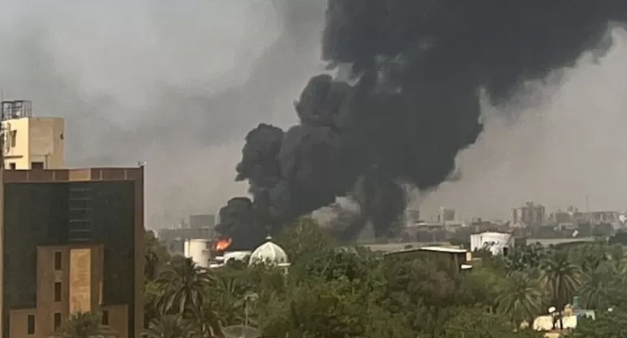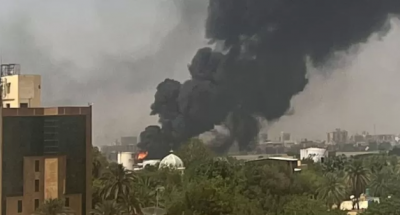Today marks the one hundredth day since the outbreak of fighting in Sudan between the army and the paramilitary Rapid Support Forces. The conflict has resulted in the deaths of at least three thousand people, with the actual death toll potentially never being known. The fighting has also led to the destruction of large parts of the capital, Khartoum, a sharp increase in ethnically driven violence, and the displacement of over three million Sudanese.
Despite the presence of representatives from both army chief Abdel Fattah al-Burhan and his former deputy, the leader of the Rapid Support Forces, in Jeddah, Saudi Arabia, for talks aimed at reaching a ceasefire, there are no signs that either side is prepared to stop fighting and pursue peace.
Below is a timeline prepared by Reuters detailing key developments since the fighting began 100 days ago:
- **April 15:** After weeks of rising tensions over a plan to hand power to civilians, violent fighting erupts in Khartoum, with clashes reported in several other cities. The Rapid Support Forces loyal to Mohamed Hamdan Dagalo, known as Hemeti, storm the residence of army chief General Abdel Fattah al-Burhan while trying to seize strategic locations in the heart of the capital.
- **April 16:** The United Nations World Food Programme announces it is temporarily halting operations in Sudan, the largest such program in the world, after three of its staff members were killed among other aid workers in the initial hours of fighting. The program later states on May 1 that it will resume operations, warning that over three million more people could face hunger, and farmers may not be able to plant their crops.
- **April 21:** The number of citizens fleeing Khartoum accelerates as areas in the city come under airstrikes by the army and clashes and looting by the Rapid Support Forces occur. Many seek refuge outside Khartoum while some head towards the Sudanese borders with neighboring countries.
- **April 22:** The United States announces that special operations forces have evacuated all embassy staff in Khartoum. France, Britain, and other countries follow suit, leaving Sudanese citizens concerned they have been abandoned to face their fate alone.
- **April 25:** Ahmed Haroun, a former minister wanted by the International Criminal Court for alleged crimes in Darfur, states that he and other former officials in the ousted president Omar al-Bashir's administration have been released from prison. Officials later confirm that Bashir, also wanted by the ICC, was transferred to a military hospital before fighting broke out.
- **May 5:** UNICEF reports that over a million doses of polio vaccine have been destroyed as a result of looting, following warnings that healthcare access and hospital capacity are collapsing due to the fighting. The World Food Programme reports extensive looting of its supplies.
- **May 20:** The warring parties in Sudan agree, during talks hosted by Saudi Arabia and the U.S. in Jeddah, to a seven-day ceasefire aimed at allowing humanitarian aid deliveries. Reports later emerge of violations of the agreement by both sides, while aid agencies continue to struggle to deliver relief assistance. Jeddah talks are postponed to June.
- **May 29:** The head of the UN refugee agency states that estimates of one million people fleeing Sudan by October may prove conservative, warning that arms and human trafficking could extend across a fragile region.
- **June 8:** The announcement of mobilization within the Sudan People's Liberation Movement-North rebel group in South Kordofan raises fears of the conflict expanding to southern Sudanese areas. Clashes in South Kordofan and Blue Nile states cause population displacements.
- **June 14:** The governor of West Darfur state, Khames Abkar, is killed hours after a televised interview in which he accused the Rapid Support Forces and allied militias of committing genocide against non-Arab groups. Thousands of civilians attempt to flee on foot to neighboring Chad after his death, but they are targeted during their escape.
- **June 19:** International donors pledge $1.5 billion in aid for Sudan and neighboring regions at a fundraising conference held in Geneva, which corresponds to half of the estimated needs for a deepening humanitarian crisis.
- **July 13:** Egypt begins a new mediation effort between the warring parties in Sudan at a summit of Sudan's neighboring countries held in Cairo. The Ethiopian Prime Minister states that this endeavor should be coordinated with the ongoing initiative led by the Intergovernmental Authority on Development (IGAD), amid concerns over competing and ineffective diplomatic efforts.
- **July 14:** The U.S.-based Sudan Conflict Observatory reports that the Rapid Support Forces and their allied forces are accused of deliberately destroying at least 26 residential areas in Darfur. A day earlier, the International Criminal Court announced it is investigating the violence in Darfur. The Rapid Support Forces claim that the hostilities there are of a tribal nature.




